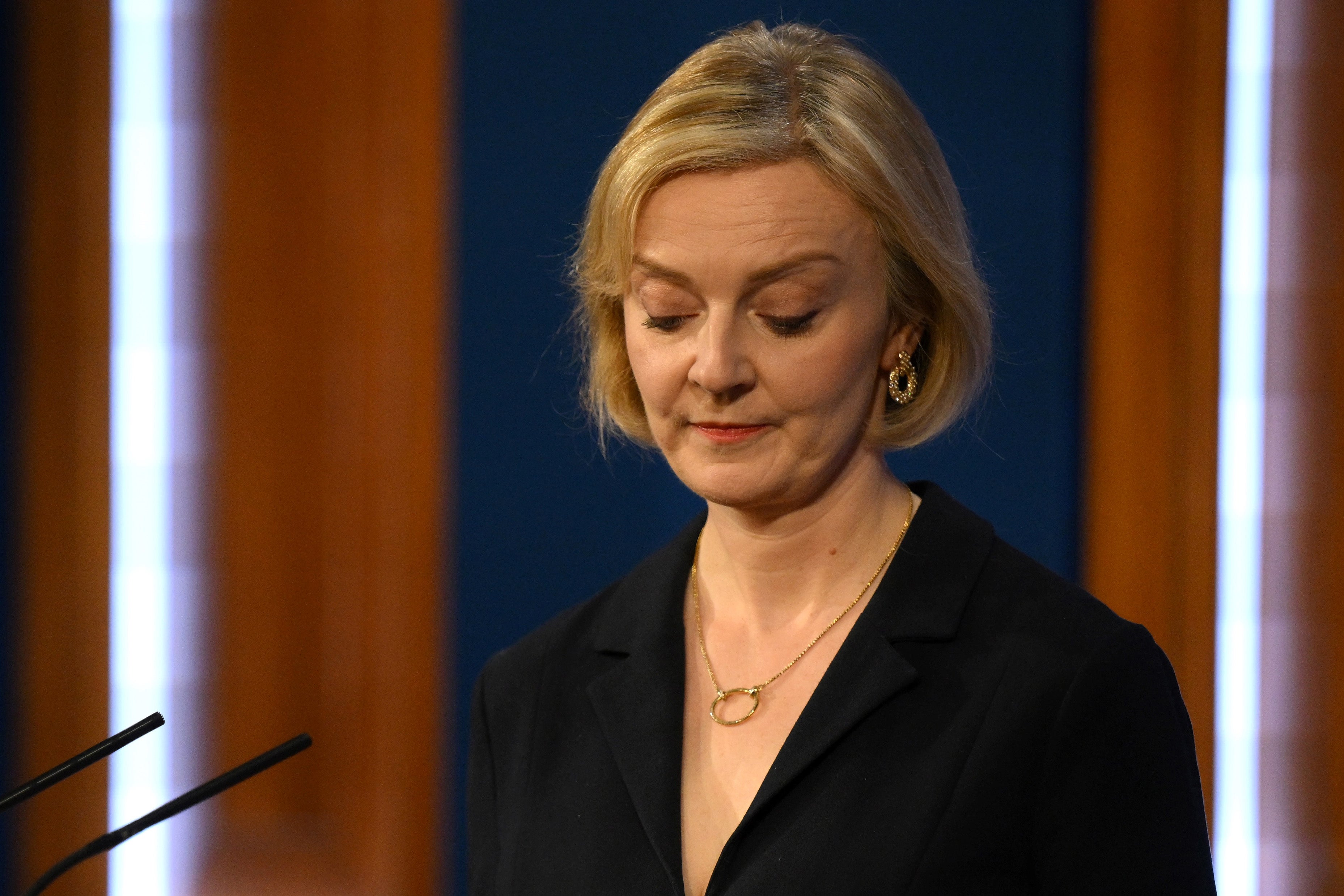We’ve just witnessed the beginning of the end of Liz Truss’s premiership
The prime minister’s U-turn has saved her job until at least the end of the month, writes John Rentoul


An eight-minute press conference in which Liz Truss confirmed all the news that had already leaked from No 10 – but was unable to explain any of it – marked the beginning of the end of her premiership, just 38 days after it began.
We had known the U-turn was coming for days, but it was still shocking to hear her say the words: “I have therefore decided to keep the increase in corporation tax that was planned by the previous government.”
The central promise of her leadership election campaign, to reverse Rishi Sunak’s tax rises, abandoned. There was no explanation, only an excuse: that the global economic situation had developed not necessarily to her advantage, and that she and Kwasi Kwarteng were too forward-thinking for the markets, which hadn’t expected them to go so far, so fast. No acceptance of error; no apology; only a self-regarding statement of the obvious: “I want to be honest: this is difficult.”
Most difficult, of course, was having to sack Kwasi Kwarteng, her friend and fellow tax-cut believer. She didn’t even try to explain why that was necessary, possibly because everyone knows that she had to sack him to try to make the U-turn credible. In theory, a new policy would require a new government to sell it, because the markets wouldn’t believe that this prime minister and her former chancellor could implement a policy in which they so obviously didn’t believe.
So, given that she did not want to resign, Kwarteng had to “stand aside”, as he put it in his resignation letter. Jeremy Hunt will be able to reassure the markets, but if fiscal credibility is a collective quality, Truss’s lack of judgement in making all the early wrong decisions “in lockstep” with Kwarteng is not going to be forgotten.
Hunt will presumably be able to present a medium-term fiscal plan at the end of the month that will satisfy the Office for Budget Responsibility and the markets that the government has debt under control. It was not clear from today’s press conference how that will be achieved, because raising corporation tax, substantial although it is, isn’t nearly enough on its own.
More attention will need to be paid to a line of Truss’s statement that wasn’t interrogated by the journalists present, mainly because she took only four questions: “Spending will grow less rapidly than previously planned.” This risks contradicting her claim in the Commons on Wednesday that she is not planning public spending cuts, which appeared to mean that spending would keep pace with inflation – although it wasn’t clear what measure of inflation was being used.
It may be that, once Hunt has had a look at the figures over the weekend, further tax rises will be needed. If so, further U-turns will be made. Whatever has to be done to make the numbers add up by Halloween will be done. The OBR – and therefore the markets – have to be satisfied: Truss has no choice. She is now in hock, not just to the OBR and the markets, but to Hunt – who will make the decisions.
She will have averted the immediate threat to her premiership, by bowing to what she used to call “abacus economics”, which is known to most of us as arithmetic. If the markets accept that the public finances are a going concern, the early danger will have passed. The political threat will remain.
The Conservative Party is in a terrible state. Tory MPs have lost confidence in her ability to govern with basic competence, and therefore do not want her to lead them into the next election. But they are hopelessly divided over what to do about it.
To keep up to speed with all the latest opinions and comment sign up to our free weekly Voices Dispatches newsletter by clicking here
Appointing Hunt as chancellor was an astute move on her part, because it resurrects another possible unity candidate. If he presents a successful Halloween Budget, his name could be added to those of Rishi Sunak and Penny Mordaunt as possible joint leaders of a government of national unity constructed to end the Tory civil war.
Truss has bought herself time, but has already destroyed most of her political capital. She is in the position of a prime minister who has been in government for years and has finally exhausted her stock, and she has achieved it in just 38 days. Once we start writing about a prime minister “buying some time”, or “seeing off the immediate danger”, they are nearing the end of their time – and the end will happen, as Ernest Hemingway’s character went bankrupt, “gradually, then suddenly”.
Once Tory MPs have decided she has to go, and I think they have, it will happen. By her U-turn today, and her surrender to the OBR, the markets and Jeremy Hunt, she has ensured that she will survive until the end of the month. After that, it will end gradually, then suddenly.






Join our commenting forum
Join thought-provoking conversations, follow other Independent readers and see their replies
Comments